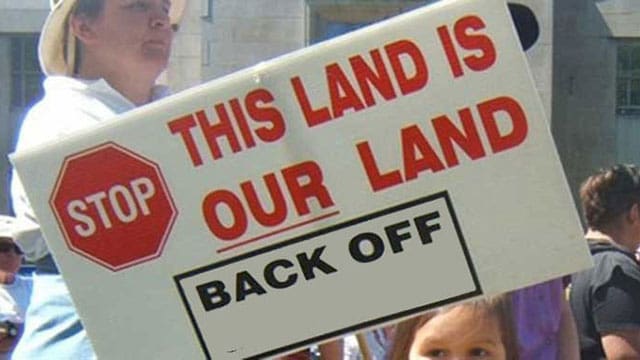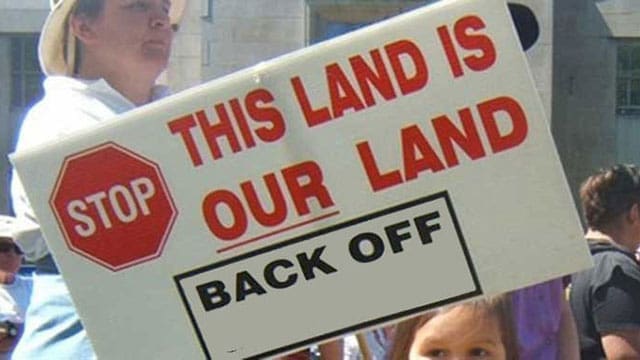Are recent legal changes in Canada putting equality under the law at risk? Could property rights be in jeopardy due to Indigenous land claims?
 Equality before the law has always been a point of pride for Canadians. It’s a fundamental part of who we are as a country – a belief that no matter your background, race, or financial situation, everyone should be treated the same in the eyes of the law.
Equality before the law has always been a point of pride for Canadians. It’s a fundamental part of who we are as a country – a belief that no matter your background, race, or financial situation, everyone should be treated the same in the eyes of the law.
However, some legal changes happening in Canada are raising serious questions. Are we still a nation where everyone is equal under the law, or are we slowly becoming a society where legal rights are determined by race and history?
This is a question that Brian Giesbrecht, a retired judge and senior fellow with the Frontier Centre for Public Policy, has been thinking about for some time. In a recent conversation I had with Brian, he shared his thoughts on how the legal landscape in Canada is shifting, particularly when it comes to Indigenous land claims and the implications for equality under the law.
One of the biggest developments is occurring in British Columbia, where the Haida Title Act is shaking things up. This act recognizes Haida Aboriginal title over 10,000 square kilometres of land in Haida Gwaii, effectively handing control of that land over to the Haida Nation. On the surface, this might seem like a positive step toward addressing historical wrongs, but there are some major concerns about how it will affect landowners, businesses, and residents.
 |
| Related Stories |
| Canada’s property rights slipping behind global competitors
|
| Economic freedom stifled by inadequate property rights
|
| Public’s role is crucial in upholding property rights
|
For example, legal experts, including Aboriginal law scholar Tom Isaac, have pointed out that this agreement doesn’t clearly protect private property rights. This means people who thought they owned their land outright are now left wondering what their property rights really mean.
But this isn’t just about British Columbia. The issue of Indigenous land claims is playing out across Canada, thanks in large part to the Supreme Court’s interpretations of Section 35 of the Constitution, which recognizes and affirms Aboriginal and treaty rights. The court has introduced concepts like Aboriginal title and the duty to consult, which have created a legal environment where Indigenous groups can challenge the government’s control over land – much of it Crown land – across the country.
The result? A lot of legal uncertainty. And while the intention behind these rulings was to address historical injustices, they’ve also raised some tough questions about the future of property rights in Canada. For example, in British Columbia, where much of the land isn’t covered by treaties, the courts have created what Giesbrecht describes as a Pandora’s box of legal uncertainty. Property owners and businesses are now left in limbo, unsure of where they stand.
Making matters even more complicated is the United Nations Declaration on the Rights of Indigenous Peoples (UNDRIP), which Canada adopted and British Columbia enshrined in law. UNDRIP asserts that Indigenous peoples have the right to control lands they traditionally occupied. While this is framed as a step toward reconciliation, its implementation has left many Canadians wondering what it means for their own property rights.
Supporters of these changes argue that they’re necessary to right historical wrongs and that Indigenous peoples deserve a greater say in how land and resources are managed. But critics, including Giesbrecht, worry that we’re heading down a path that could divide the country. If different sets of rules apply to different groups of people, what happens to the principle of equality that’s supposed to be at the heart of Canadian society?
And it’s not just the legal changes that are raising eyebrows. The way these changes are being implemented is causing concern as well. Take the recent attempt by the NDP government in British Columbia to push through major changes to the Land Act with almost no public consultation. The government’s lack of transparency has led to accusations that they’re trying to reshape the province’s legal landscape without properly engaging with the people who will be most affected.
The consequences of all this are already being felt. In 2022, a violent attack on the Coastal GasLink pipeline project in northern British Columbia highlighted just how tense things have become over Indigenous land rights. Despite millions of dollars in damage, there have been no charges against those responsible. This kind of hands-off approach raises serious questions about the rule of law in Canada. If some groups are above the law, how can we continue to claim that we’re all equal?
There’s no question that addressing historical injustices is important. Indigenous peoples in Canada have faced centuries of discrimination, and we absolutely need to work toward ensuring that they have the opportunity to thrive. But Giesbrecht believes that we can’t pursue reconciliation at the expense of the basic principles that make Canada what it is. Equality before the law needs to stay front and centre. If we start allowing legal rights to be determined by race, we risk dividing our society and undermining the very foundation of our nation.
The road ahead is going to be tricky. Canada needs to find a balance between addressing historical wrongs and making sure that all Canadians – Indigenous and non-Indigenous alike – are treated equally under the law. This will require careful thought and a commitment to transparency and public debate.
Only by doing this can we ensure that equality before the law remains a reality in Canada, not just a lofty ideal.
David Leis is the Frontier Centre for Public Policy’s vice president for development and engagement and host of the Leaders on the Frontier podcast.
For interview requests, click here.
The opinions expressed by our columnists and contributors are theirs alone and do not inherently or expressly reflect the views of our publication.
© Troy Media
Troy Media is an editorial content provider to media outlets and its own hosted community news outlets across Canada.

